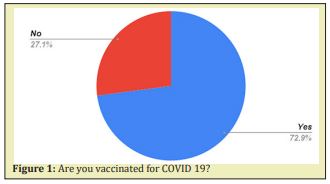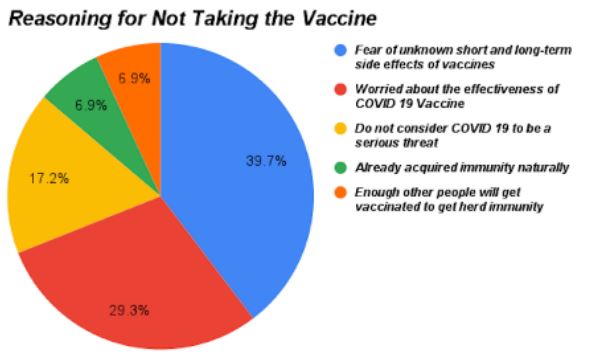Coronavirus disease (COVID-19) is an infectious disease caused by the SARS-CoV-2 virus. It is a global pandemic and has led to serious illness and death among all ages and even in younger adults who are otherwise healthy. The best way to prevent and slow down the transmission of this deadly disease is to get vaccinated. As per the CDC teenagers and young adults between the ages of 12 to 24 have the lowest vaccination rate among those eligible to receive a COVID vaccine. We did a survey-based study among high school and college students to find out the reasons for the reluctance of Covid 19 vaccination.
Keywords: COVID-19, Teenagers, Vaccination
Covid-19 is a global health pandemic and has caused almost 5.5 million deaths as of January 2022.1 The USA experienced the highest Covid- 19 associated mortality among the world countries. COVID-19 vaccinations played a crucial role in flattening out the number of cases and deaths. Currently, Vaccines from Pfizer-BioNTech, Moderna, and Johnson & Johnson are being administered in the United States. These vaccines have received emergency use authorization for adults and can also be given to kids five and older. As of January 2022, only 53% of the population from ages 12 -17 years and 59% from ages 18-24 years are fully vaccinated. As the Omicron variant has quickly spread around the U.S, the lower reported vaccination rates and intent to get vaccination especially among younger Americans is very concerning. We did a survey to know the reasons why younger people are still hesitant to vaccines even a year after they became available.

A survey-based research study was conducted; Institutional Review Board approval was not required for this study since it was anonymous and survey-based, and subjects were not identifiable by their answers. Approximately 214 students participated in the survey. The survey is conducted through google forms and printed forms. All the students who participated in the survey were high school or in college during the 2021-2022 school year. They were surveyed regarding whether they were vaccinated by the Coronavirus Vaccine or not. Unvaccinated people were given extra questions to gain insight into the reasoning of the respondent for not taking the vaccine.

Out of the 214 respondents, 180 students (84.1%) stated that they had never been infected with Covid-19, while only thirty-four students (15.9%) responded saying that they had been infected before. Similarly, 156 students (72.9%) stated that they had been vaccinated already or had the intention of being vaccinated, while fifty-eight respondents (27.1%) said that they had no intention of being vaccinated for coronavirus. The majority of unvaccinated students were male (67.9%) while the remaining unvaccinated population was others.
58 people who were unvaccinated or with no intention of getting vaccinated were given extra questions to gain insight into the main reasoning of the respondent for not taking the vaccine. Among fifty-eight unvaccinated people, 23 students (39.6%) are worried about the safety especially long term and short-term effects of vaccines, around 17 (29.3%) students are worried about the effectiveness of the vaccine and 10(17.2%) students do not consider covid-19 to be a serious threat for them. The remaining 8(13.8%) students believe that they already acquired immunity naturally or enough other people will get vaccinated to get herd immunity.
The main intention of COVID-19 vaccination is to accomplish herd immunity and to end the pandemic. Vaccine hesitancy among teenagers and young adults is one of the biggest challenges in the fight against Covid 19. The main reason for rejecting vaccination inferred from our study is safety concerns, doubts about efficacy, and not understanding the severity of the disease. Educational and social media campaigns targeted towards these young populations at risk of vaccine hesitancy are needed urgently to address misconceptions about the COVID-19 vaccines. The currently approved mRNA-based COVID-19 vaccines were extensively tested and approved by independent scientific teams for safety and more than 100 million people in the U.S. alone have been safely vaccinated.2-4 Recent data shows that unvaccinated younger adults are more prone to severe disease and deaths from COVID 19 compared to vaccinated.5 The hesitant young adults need to be educated that vaccination protects them from hospitalizations and severe outcomes caused by COVID-19 variants including omicron and delta.6-8
Evidence-based approaches at the school and college levels are necessary to improve vaccination efforts and decrease hesitancy. Educating the students and young adults about the safety and efficacy of the current vaccines reduces the devastating loss of health, life, and economic and social well-being that has resulted from the global spread of Covid-19.
None.
None.
Author declares that there is no conflict of interest.
- 1. Covid-19 coronavirus pandemic. (2022).
- 2. Barda N, Dagan N, Ben Shlomo Y, et al. Safety of the BNT162b2 mRNA Covid-19 Vaccine in a Nationwide Setting. N Engl J Med. 2021;385(12):1078–1090.
- 3. Anand P, Stahel VP. Review the safety of Covid-19 mRNA vaccines: a review. Patient Saf Surg. 2021;1:20–10.
- 4. Polack FP, Thomas SJ, Kitchin N, et al. Safety and Efficacy of the BNT162b2 mRNA Covid-19 Vaccine. N Engl J Med. 2020;31:2603–2615.
- 5. Uzun O, Akpolat T, Varol A, et al. COVID- 19: vaccination vs. hospitalization. Infection. 2022;4:1–6.
- 6. SARS-CoV-2 Infection and Hospitalization Among Adults Aged ≥18 Years, by Vaccination Status, Before and During SARS-CoV-2 B.1.1.529 (Omicron) Variant Predominance-Los Angeles County, California. DCD. 2021;71(5):177–181.
- 7. León TM, Dorabawila V, Nelson L, et al. COVID-19 cases and hospitalizations by COVID-19 vaccination status and previous COVID-19 diagnosis-California and New York. DCD. 2021;2022;77(4):125–131.
- 8. Thompson MG, Natarajan K, Irving SA, et al. Effectiveness of a third dose of mRNA vaccines against COVID-19-associated emergency department and urgent care encounters and hospitalizations among adults during periods of Delta and Omicron variant predominance-VISION Network, 10 states. CDC. 2022;77(7):255–263.

